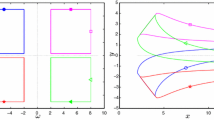Abstract
Schwarz waveform relaxation algorithms (SWR) are naturally parallel solvers for evolution partial differential equations. They are based on a decomposition of the spatial domain into subdomains, and a partition of the time interval of interest into time windows. On each time window, an iteration, during which subproblems are solved in space-time subdomains, is then used to obtain better and better approximations of the overall solution. The information exchange between subdomains in space-time is performed through classical or optimized transmission conditions (TCs). We analyze in this paper the optimization problem when the time windows are short. We use as our model problem the optimized SWR algorithm with Robin TCs applied to the heat equation. After a general convergence analysis using energy estimates, we prove that in one spatial dimension, the optimized Robin parameter scales like the inverse of the length of the time window, which is fundamentally different from the known scaling on general bounded time windows, which is like the inverse of the square root of the time window length. We illustrate our analysis with a numerical experiment.
Similar content being viewed by others
References
Bellen, A., Zennaro, M.: The use of Runge-Kutta formulae in waveform relaxation methods. Appl. Numer. Math. 11(1–3), 95–114 (1993). Parallel methods for ordinary differential equations (Grado 1991). MR1197152 (94c:65090)
Bennequin, D., Gander, M.J., Halpern, L.: A homographic best approximation problem with application to optimized Schwarz waveform relaxation. Math. Comput. 78(265), 185–232 (2009)
Bjørhus, M.: A note on the convergence of discretized dynamic iteration. BIT Numerical Mathematics 35(2), 291–296 (1995). MR1429020 (97i:65106)
Burrage, K.: Parallel and Sequential Methods for Ordinary Differential Equations. Numerical Mathematics and Scientific Computation. The Clarendon Press Oxford University Press, New York (1995). Oxford Science Publications. MR1367504 (97f:65021)
Colombo, S., Lavoine, J.: Transformations de Laplace et de Mellin. Gauthier-Villars Éditeur, Paris, Formulaires. Mode d’utilisation, Mémorial des Sciences Mathématiques, Fasc. CLXIX. MR0352885 (50 #5371) 1972
Daoud, D.S., Gander, M.J.: Overlapping Schwarz waveform relaxation for advection reaction diffusion problems. Bol. Soc. Esp. Mat. Appl. 46, 75–90 (2009)
Després B.: Méthodes de décomposition de domaine pour les problèmes de propagation d’ondes en régime harmonique. Le théorème de Borg pour l’équation de Hill vectorielle, Institut National de Recherche en Informatique et en Automatique (INRIA), Rocquencourt, 1991, Thèse, Université de Paris, IX, Dauphine, Paris, 1991
Gander, M.J., Al-Khaleel, M., Ruehli, A.: Optimized waveform relaxation methods for longitudinal partitioning of transmission lines. IEEE Trans. Circuits Syst. I 56(8), 1732–1743 (2009)
Gander, M.J., Halpern, L.: Optimized Schwarz waveform relaxation methods for advection reaction diffusion problems. SIAM J. Numer. Anal. 45(2), 666–697 (2007)
Gander, M.J., Ruehli, A.: Optimized waveform relaxation methods for RC type circuits. IEEE Trans. Circuits Syst. I 51(4), 755–767 (2004)
Gander, M.J., Ruehli, A.E.: Optimized waveform relaxation solution of electromagnetic and circuit problems. Digest of Electr. Perf. Electronic Packaging (Austin, TX) 19, 65–68 (2010)
Gander, M.J.: Optimized Schwarz methods. SIAM J. Numer. Anal. 44(2), 699–731 (2006)
Gander, M.J., Halpern, L.: Méthodes de relaxation d’ondes (SWR) pour l’équation de la chaleur en dimension 1. C.R. Math. Acad. Sci. Paris 336(6), 519–524 (2003). MR1975090 (2004a:65124)
Gander, M.J., Halpern, L.: Absorbing boundary conditions for the wave equation and parallel computing. Math. Comput. 74(249), 153–176 (2005). (electronic) MR2085406 (2005h:65158)
Gander, M.J., Halpern, L., Nataf, F.: Optimal Schwarz waveform relaxation for the one dimensional wave equation. SIAM J. Numer. Anal. 41(5), 1643–1681 (2003). MR2035001 (2005h:65252)
Gander, M.J., Stuart, A.M.: Space-time continuous analysis of waveform relaxation for the heat equation. SIAM J. Sci. Comput. 19(6), 2014–2031 (1998). MR1638096 (99h:65164)
Gander, M.J., Zhao, H.: Overlapping Schwarz waveform relaxation for the heat equation in n dimensions. BIT Numerical Mathematics 42(4), 779–795 (2002). MR1944537 (2003m:65170)
Giladi, E., Keller, H.B.: Space-time domain decomposition for parabolic problems. Numer. Math. 93(2), 279–313 (2002). MR1941398 (2003j:65088)
Hairer, E., Wanner, G.: L’analyse au fil de l’histoire, Vol. 10. Springer-Verlag, Berlin (2001)
Jeltsch, R., Pohl, B.: Waveform relaxation with overlapping splittings. SIAM J. Sci. Comput. 16(1), 40–49 (1995). MR1311677 (95j:65079)
Lelarasmee, E., Ruehli, A.E., Sangiovanni-Vincentelli, A.L.: The waveform relaxation method for time-domain analysis of large scale integrated circuits. IEEE Trans. Comput.-Aided Des. Integr. Circuits Syst. CAD-1 3, 131–145 (1982)
Lions, P.-L.: On the Schwarz alternating method. III. A variant for nonoverlapping subdomains. In: Third International Symposium on Domain DecompositionMethods for Partial Differential Equations (Houston, TX, 1989), pp. 202–223. SIAM, Philadelphia, PA (1990)
Miekkala, U., Nevanlinna, O.: Convergence of dynamic iteration methods for initial value problem. SIAM J. Sci. Statist. Comput. 8(4), 459–482 (1987). MR892300 (89f:65076)
Nevanlinna, O.: Remarks on Picard-Lindelöf iteration. II. BIT Numerical Mathematics 29(3), 535–562 (1989). MR1009655 (91b:65088)
Oberhettinger, F., Badii, L.: Tables of Laplace Transforms. Springer-Verlag, New York (1973). MR0352889 (50 #5375)
Author information
Authors and Affiliations
Corresponding author
Rights and permissions
About this article
Cite this article
Courvoisier, Y., Gander, M.J. Optimization of Schwarz waveform relaxation over short time windows. Numer Algor 64, 221–243 (2013). https://doi.org/10.1007/s11075-012-9662-y
Received:
Accepted:
Published:
Issue Date:
DOI: https://doi.org/10.1007/s11075-012-9662-y




